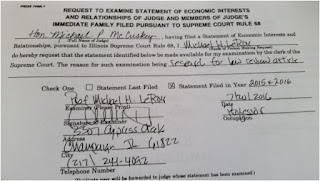Suppose you’re an employee who is suing Wal-Mart for
wrongful termination; or you’re an employer who is suing State Farm for
fraudulently misrepresenting an insurance policy; or you’re suing a publicly owned
landfill company to prevent them from building a new dump over your aquifer; or
you’re a large company who is suing to stop Exelon from raising its rates.
You
might want to know if your judge has a financial interest in your case. Or, as
in my case, you want to know if a judge is receiving a full-salary pension from
federal courts and is double dipping by working now as a state judge.
Here is the form you’ll need to complete (see picture).
You’ll be required to identify yourself, list your address
and list your phone number.
You’ll need to state your occupation.
You’ll be told: “Duplicate copy will be forwarded to judge
whose statement has been examined.”
Let’s examine the state’s interest in collecting this information
from you.
Your identity: It’s against the law to harass, threaten, intimidate,
stalk, interfere with a judge's business relationships, and injure a judge. Seeking a judge’s financial statement has no connection to these illicit acts.
But requiring you to identify yourself is a judge’s way to intimidate you into
not asking for this information.
Your address: There is no obvious state interest in seeking
this information—but asking for it has a chilling effect. An address is needed
to serve a person with a subpoena for records or order to appear in court, under threat of possible contempt.
Your occupation: What does this have to do with seeking
public information? Are lawyers privileged to get this information, but
reporters and researchers aren’t? If you're unemployed, do you not get the information? Is the intent to contact your employer?
The more fundamental question is, why isn’t this material
available online to the public? If we elect judges (we do), and if judges are
required to recuse themselves in matters where they have a financial interest
(they are so required), why must we drive to Springfield or Chicago, go through
a security line, and fill out a form that turns the tables on us for seeking
information?
Put another way: If it’s this hard to acquire financial
information about a judge, then why require them to make these annual
disclosures?

No comments:
Post a Comment